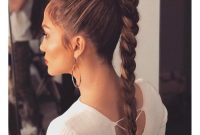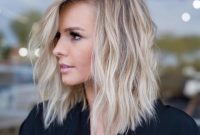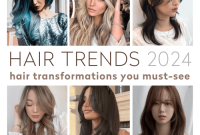Hair is a vital part of our appearance and self-confidence. It frames our face, enhances our style, and can make us feel beautiful and empowered. But maintaining healthy, vibrant hair can be a challenge, especially with the myriad of hair care products and advice available.
In this comprehensive guide, we will delve into the science of hair growth, explore effective hair care routines, and provide expert tips for styling and maintaining healthy hair for all hair types.
Whether you’re struggling with hair loss, want to enhance your hair’s natural beauty, or simply want to learn more about proper hair care, this guide has something for everyone. So sit back, relax, and let’s embark on a journey to discover the secrets of healthy, luscious hair.
Hair Care Routine
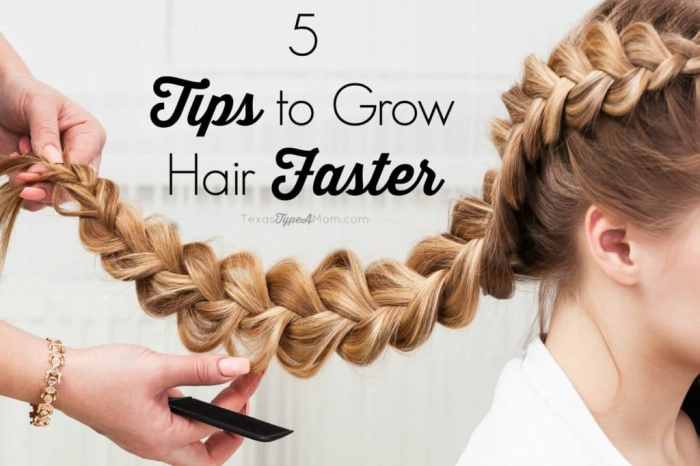
Maintaining healthy hair requires a consistent hair care routine that addresses your hair’s specific needs. A personalized routine helps prevent damage, promote growth, and enhance the overall appearance of your hair.
To create a personalized hair care routine, consider your hair type, texture, and scalp condition. Determine the frequency and type of cleansing, conditioning, and styling products that suit your hair’s needs. Experiment with different products and techniques to find what works best for you.
Benefits of Natural Hair Care Products
Natural hair care products, free from harsh chemicals and synthetic ingredients, offer several benefits for your hair and scalp.
- Gentler on hair and scalp, reducing irritation and dryness.
- Rich in vitamins, minerals, and antioxidants, nourishing and protecting hair.
- Free from harmful chemicals that can damage hair and cause scalp issues.
Hair Growth

Hair growth is a complex process involving various factors, including genetics, diet, and nutrition. Understanding the science behind hair growth can help you adopt effective strategies to promote healthy hair.
The hair growth cycle consists of three phases: anagen (growth phase), catagen (transition phase), and telogen (resting phase). During the anagen phase, hair follicles actively produce new hair shafts. The length of the anagen phase determines the maximum length your hair can grow.
Role of Genetics
Genetics play a significant role in hair growth patterns, texture, and color. Genes influence the size and shape of hair follicles, which affect hair thickness and density. Additionally, genes control the production of hair growth hormones and the sensitivity of hair follicles to these hormones.
Impact of Diet and Nutrition
A balanced diet rich in essential nutrients is crucial for healthy hair growth. Protein, vitamins (especially B vitamins), minerals (such as iron and zinc), and omega-3 fatty acids are vital for maintaining hair health. A deficiency in any of these nutrients can lead to hair loss or impaired growth.
Hair Growth Tips
Achieving healthy, long hair requires a combination of proper hair care practices and lifestyle habits. Here’s a comprehensive list of tips to promote hair growth:
Scalp Health
A healthy scalp is essential for optimal hair growth. Keep your scalp clean by washing it regularly with a gentle shampoo. Massage your scalp to improve circulation and remove product buildup. Exfoliate your scalp weekly to remove dead skin cells and promote hair growth.
Diet and Nutrition
A balanced diet rich in vitamins, minerals, and protein is crucial for hair growth. Include plenty of fruits, vegetables, whole grains, and lean protein in your diet. Consider taking hair growth supplements such as biotin, collagen, and zinc, which have been shown to improve hair growth and quality.
Hair Care Routine
Treat your hair gently to prevent breakage and damage. Avoid using harsh chemicals or heat styling tools excessively. Opt for natural hair care products whenever possible. Regular trims can remove split ends and promote healthy hair growth.
Lifestyle Habits
Certain lifestyle habits can affect hair growth. Manage stress levels, as chronic stress can lead to hair loss. Get enough sleep, as it promotes hair growth hormones. Avoid smoking, as it can damage hair follicles.
Other Tips
- Use a wide-toothed comb to detangle hair gently.
- Avoid tight hairstyles that can pull on hair and cause breakage.
- Protect your hair from sun damage by wearing a hat or using a leave-in conditioner with UV protection.
Hair Loss Prevention
Hair loss is a common problem that can affect people of all ages. While some hair loss is normal, excessive hair loss can be a sign of an underlying medical condition. There are a number of common causes of hair loss, including:
- Genetics
- Hormonal changes
- Medical conditions
- Medications
- Styling practices
There are a number of things you can do to prevent hair loss, including:
- Maintaining a healthy diet
- Getting regular exercise
- Managing stress
- Avoiding harsh hair care products
- Protecting your hair from the sun
Stress Management
Stress is a major contributor to hair loss. When you’re stressed, your body releases hormones that can damage hair follicles. Managing stress can help to prevent hair loss and promote hair growth.
There are a number of things you can do to manage stress, including:
- Exercise
- Yoga
- Meditation
- Spending time in nature
- Talking to a therapist
Hair Styling
Hair styling is an art form that allows you to express your personality and creativity. Whether you’re going for a sleek and sophisticated look or something more playful and bohemian, there are endless possibilities when it comes to styling your hair.
In this section, we’ll share tips on how to style hair for different occasions, provide instructions on how to create popular hairstyles, and discuss the latest hair styling trends.
Occasional Hair Styling
The occasion you’re styling your hair for will play a big role in the style you choose. For example, if you’re going to a job interview, you’ll want to opt for a more conservative style that conveys professionalism. If you’re going to a party, on the other hand, you can have more fun with your hair and experiment with different looks.
Popular Hairstyles
There are countless popular hairstyles to choose from, so you’re sure to find one that suits your taste and personality. Some of the most popular hairstyles include:
- Bob
- Lob
- Pixie cut
- French braid
- Ponytail
- Bun
Hair Styling Trends
The hair styling trends are constantly evolving, so it’s important to stay up-to-date on the latest looks. Some of the most popular hair styling trends include:
- Beach waves
- Sleek buns
- Half-up, half-down hairstyles
- Braided crowns
- Pixie cuts with bangs
Hair Products
The hair care industry is a multi-billion dollar industry, and for good reason. People want to have healthy, beautiful hair, and there are a wide variety of products available to help them achieve that goal. However, with so many products on the market, it can be difficult to know which ones are right for you.
In this section, we will provide an overview of the different types of hair products available, explain the benefits and drawbacks of each type, and discuss the importance of choosing the right products for your hair type.
Shampoos
Shampoos are used to cleanse the hair and scalp. They remove dirt, oil, and product buildup, leaving hair feeling clean and refreshed. There are many different types of shampoos available, each designed for a specific hair type or concern. For example, there are shampoos for dry hair, oily hair, color-treated hair, and dandruff.
When choosing a shampoo, it is important to consider your hair type and concerns. If you have dry hair, you will want to choose a shampoo that is moisturizing and gentle. If you have oily hair, you will want to choose a shampoo that is clarifying and removes excess oil.
If you have color-treated hair, you will want to choose a shampoo that is sulfate-free and protects your color.
Conditioners
Conditioners are used to moisturize and detangle the hair. They make hair softer, smoother, and more manageable. There are many different types of conditioners available, each designed for a specific hair type or concern. For example, there are conditioners for dry hair, oily hair, color-treated hair, and damaged hair.
When choosing a conditioner, it is important to consider your hair type and concerns. If you have dry hair, you will want to choose a conditioner that is moisturizing and hydrating. If you have oily hair, you will want to choose a conditioner that is lightweight and does not weigh your hair down.
If you have color-treated hair, you will want to choose a conditioner that is sulfate-free and protects your color.
Styling Products
Styling products are used to hold hair in place and create different styles. There are many different types of styling products available, each designed for a specific hair type or style. For example, there are styling products for curly hair, straight hair, fine hair, and thick hair.
When choosing a styling product, it is important to consider your hair type and the style you want to create. If you have curly hair, you will want to choose a styling product that defines your curls and reduces frizz.
If you have straight hair, you will want to choose a styling product that adds volume and hold. If you have fine hair, you will want to choose a styling product that does not weigh your hair down. If you have thick hair, you will want to choose a styling product that provides strong hold.
Hair Care for Different Hair Types
Understanding your hair type is crucial for maintaining healthy, beautiful hair. Different hair types have unique characteristics and require tailored care routines to thrive.
Fine Hair
Fine hair tends to be thin and delicate. It can lack volume and easily become greasy. To care for fine hair:
- Use volumizing shampoos and conditioners.
- Avoid weighing hair down with heavy products.
- Style hair with products that add body and lift.
Thick Hair
Thick hair is dense and coarse. It can be prone to dryness and tangles. To care for thick hair:
- Use moisturizing shampoos and conditioners.
- Apply leave-in conditioners or hair masks for deep hydration.
- Use a wide-toothed comb to prevent breakage.
Curly Hair
Curly hair has a natural wave or coil pattern. It can be prone to dryness and frizz. To care for curly hair:
- Use sulfate-free shampoos and conditioners.
- Apply leave-in conditioners or hair masks regularly.
- Use styling products designed for curly hair to define curls and reduce frizz.
Straight Hair
Straight hair lacks natural curl or wave. It can be prone to oiliness. To care for straight hair:
- Use clarifying shampoos to remove excess oil.
- Apply smoothing conditioners to tame flyaways.
- Use styling products that add shine and control frizz.
Color-Treated Hair
Color-treated hair has undergone chemical processing, which can damage the hair shaft. To care for color-treated hair:
- Use color-safe shampoos and conditioners.
- Apply deep conditioning treatments regularly.
- Avoid excessive heat styling to prevent further damage.
Hair Care for Special Occasions
When it comes to special occasions like weddings and proms, your hair is just as important as your outfit. After all, you want to look and feel your best on your big day. That’s why it’s important to start planning your hair care routine well in advance.The
first step is to consult with a professional hairstylist. They can help you choose a style that will flatter your face shape and hair type. They can also give you tips on how to care for your hair in the weeks leading up to your event.Once
you’ve chosen a style, it’s time to start following a hair care routine that will help you achieve your desired look. This may include using special shampoos and conditioners, getting regular trims, and avoiding heat styling as much as possible.On
the day of your event, be sure to arrive at the salon with clean, dry hair. This will make it easier for your stylist to work with your hair and achieve the perfect style.With a little planning and preparation, you can ensure that your hair looks its best on your special occasion.
Hairstyling Tips
Here are a few tips to help you achieve the perfect hair style for your special occasion:
- If you’re not sure what style you want, bring pictures of hairstyles that you like to your consultation with your hairstylist.
- Be open to trying new things. Your hairstylist may have some great ideas that you wouldn’t have thought of on your own.
- Don’t be afraid to ask questions. Your hairstylist is there to help you achieve the look you want, so don’t be afraid to ask them about anything you’re not sure about.
- Be patient. It may take some time to achieve the perfect style, so don’t get discouraged if it doesn’t happen right away.
- Most importantly, relax and enjoy the experience. Getting your hair done should be a fun and relaxing experience, so make sure to take some time to enjoy it.
Outcome Summary
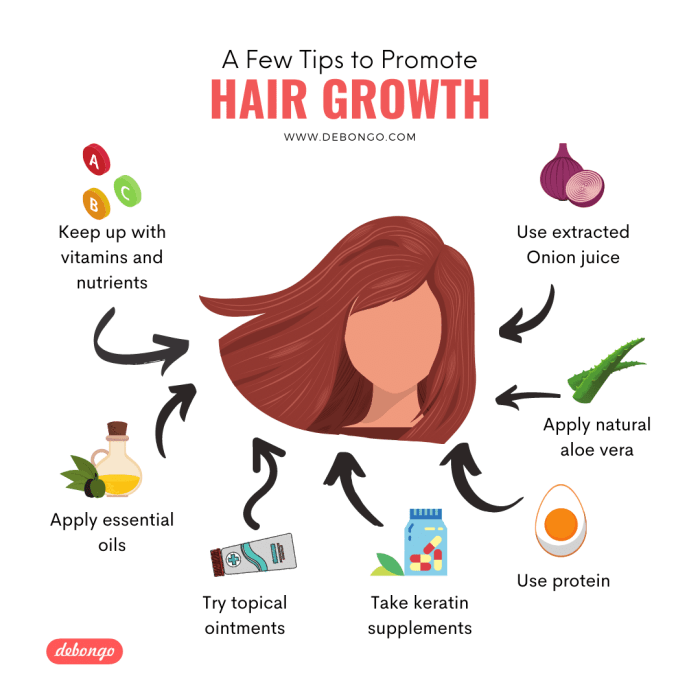
In conclusion, hair care is an essential part of maintaining a healthy appearance and boosting self-confidence. By following the tips and advice Artikeld in this guide, you can achieve your hair goals and enjoy beautiful, healthy hair for years to come.
Remember, consistency and patience are key when it comes to hair care. With the right routine and products, you can transform your hair from dull and lifeless to radiant and full of life. Embrace your hair’s unique beauty and let it shine with confidence!
Questions and Answers
What is the most important factor in hair growth?
Genetics play a significant role in hair growth, but diet, nutrition, and proper hair care can also have a major impact.
How often should I wash my hair?
The frequency of washing depends on your hair type and scalp condition. Generally, it’s recommended to wash your hair every 2-3 days, or as needed.
Can hair growth supplements really work?
Some hair growth supplements contain ingredients that have been shown to support hair growth, such as biotin, keratin, and collagen. However, it’s important to consult with a healthcare professional before taking any supplements.
What are the most common causes of hair loss?
Hair loss can be caused by a variety of factors, including genetics, hormonal changes, stress, and certain medical conditions.
How can I prevent hair loss?
Maintaining a healthy lifestyle, managing stress, and following proper hair care practices can help prevent hair loss.

